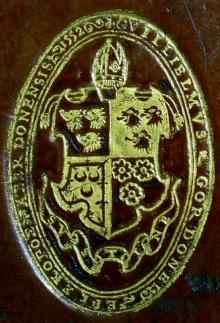William Gordon fl.1540-1577
William GORDON, Bishop of Aberdeen, fl.1540-1577
Likely born in Aberdeenshire, Gordon was the youngest son of Alexander Gordon, third earl of Huntly (d. 1524), and Jane Stewart (d. 1510), daughter of John Stewart, first earl of Atholl. He was educated at King’s College, Aberdeen, before studying at the University of Paris, and afterwards Anger, where he took a doctorate in Canon and Civil law. On his return to Scotland he was appointed Rector of Clatt, and chancellor of Moray in 1540. He was consecrated Bishop of Aberdeen in 1546, becoming the last pre-reformation Bishop of the diocese. Following the Council of Trent, he promoted the cause of Catholic reform, and had to contend with growing heresy within his diocese. He was criticised for the excessive feuing of Church lands, and clerical concubinage, of which he was personally guilty, having 8 illegitimate children with an unmarried woman. Following reformation, he survived attempts to remove him from office, and remained Bishop until his death in 1577.
Books
Stephen Mark Holmes describes the 60 plus surviving volumes from Gordon’s library as revealing “a Catholic reformer and Erasmian humanist with an interest in the early Church” (Holmes, p.119). His principal interests as Bishop were biblical commentaries, controversial and apologetic works on modern and ancient heresy, such as Adversus Omnes Haereses (Paris, 1543) by Alfonso de Castro; as well as works by moderate Catholic reformers. These include Georg Witzel’s Quadragesimales Wicelii Conciones (Cologne, 1555) and Fredrick Nausea’s Catechism (Antwerp, 1555). Allan White argues that Gordon’s library counters the negative portrayals of Gordon in later histories, describing his book buying as “inspired by the need for deeper biblical knowledge in the exercise of pastoral care of his diocese, as well as being aware of the need for informed opposition to Protestantism in the north-east of Scotland” (White, p.123).
Over half of Gordon’s surviving books were published in France, bought while he was studying there, and later imported during his occupancy of the See of Aberdeen. As Bishop he also began purchasing books published in the Louvain, Cologne, and Basel.
Characteristics
William Gordon inscribed many of his books with variations of “Liber gulielmi gordon episcopi Aberdonensis,” and bindings sometimes have his armorial stamp.
Many of Gordon’s books contain marginalia, including his his copy of William Durandus Rationale (Lyon, 1551), which was later gifted to John Sinclair, Bishop of Brechin. Gift inscriptions in Gordon’s books reveal an exchange of books between Aberdeen clergy, as well as an association with many Scottish Catholic reformers. He gave many volumes to Alexander Anderson, the Catholic Principle of Kings College; as well as books to Robert Reid, Bishop of Orkney and others.
Sources
- Aberdeen University Library Provenance Database.
- British Armorial Bindings
- Durkan, J. & Ross, A. Early Scottish Libraries (Glasgow: John S. Burns, 1961)
- Holmes, Stephen Mark. “’Out of their Reasonless Rationalls’: Liturgical Interpretation in the Scottish Reformations,” In McCallum, John, ed. Scotland's Long Reformation: New Perspectives on Scottish Religion, C. 1500-C. 1660. (Leiden: BRILL, 2016)
- Macfarlane, Leslie J. "Gordon, William (d. 1577), bishop of Aberdeen." Oxford Dictionary of National Biography
- White, A. “Religion, Politics and Society in. Aberdeen, 1543-1593” (PhD Thesis, University of Edinburgh, 1985)
